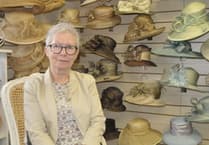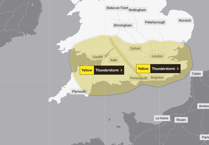On the International Day of People with Disabilities today, December 3, a former Newton Abbot College pupil is 4,000 miles from home helping to improve the lives of disabled people in Pabré, Burkina Faso, Africa.
Katie Powell, from Newton Abbot, is working with a team of young British and Burkinabé volunteers to promote the rights of disabled people with awareness-raising sessions and events to create positive change, and help stop them being neglected and outcast by their community.
She travelled to Burkina Faso through the International Citizen Service (ICS) programme, funded by UK Aid. Volunteers like Katie fundraise for the programme and in return all costs, including flights, are met for them.
The World Health Organisation estimates that 15 per cent of the world’s population lives with a disability. According to the UN, 80 per cent of those people live in developing countries.
In rural Burkina Faso, many people with disabilities struggle to access basic healthcare, and are often excluded from education – a situation which leaves them most affected by poverty, and less equipped to escape it.
Katie said: ‘In Pabré, many people think that a woman only has a disabled child as a result of her sins or wrongdoing. As a result, there is a lack of effort to try to understand people living with a disability and they are often neglected or outcast from society.’
Katie and her teammates are working with rights-based development charity International Service and its partner organisation Handicap Solidaire Burkina (HSB).
HSB works to empower disabled people to change their lives for the better, by improving their employment opportunities and raising awareness of disability rights in the community. It also helps to change negative attitudes toward disabled people in the local community, in order to help integration and improve the lives of those living with a disability.
She said: ‘The biggest challenge has been staying motivated to continue with our work when we cannot always see immediate change – development is a long process, so change will come over time.
‘But we’re working with a student society club, who we’ve trained to deliver awareness raising sessions on disability. This is a really positive sign of the social change that’s happening.’
International Citizen Service volunteers such as Katie work alongside young local volunteers in some of the poorest communities in Africa, Asia and Latin America on issues including sexual health, education and economic empowerment.
Volunteers don’t need cash, skills or qualifications to take part, just the ambition to make a difference.
Katie said: ‘I applied to International Citizen Service originally to see what working in development is like, before I applied to university to study it alongside French.
‘International development is so important because something so small in the scheme of things – like volunteering for three months – can have such a huge and lifelong impact on the lives of others.
‘For example, working to increase the rights of disabled people here in Pabré will allow for social change and they will no longer be excluded or rejected from society. Disabled people will be able to live a happier and more fulfilled life.’




